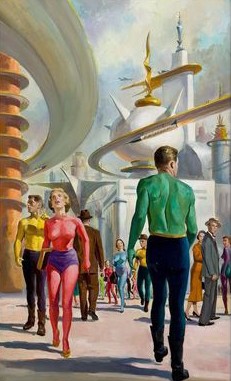Futurist Stowe Boyd outdid himself when asked to imagine the nature of corporations in 2050, as you can see in his excellent Medium essay. He believes our response to challenges of wealth inequality, climate change and AI will make things break in one of three ways, resulting in scenarios he labels Humania (great), Neo-feudalistan (not-so-great) and Collapseland (yikes!). An excerpt about the most hopeful outcome:
After mounting concern about inequality, the climate, and the inroads that AI and robots were having on society, in the 2020s Western nations — and later other developing countries — were hit by a ‘Human Spring.’ New populist movements rose up and rejected the status quo, and demanded fundamental change. At first the demands were uneven — some groups emphasized climate, or inequality, or the right to work.
But by the mid 2030s, all three forces were more-or-less equal planks in the Humania platform. This led to mandated barriers to inequality — such as limits on the multiple of the salaries of highest to lowest paid workers, and progressive taxation so that the well-off paid much higher taxes by percentage. Additionally, there were worldwide actions to limit oil and coal use, and a dramatic shift to solar in the early 2020s. Concerned that people would be pushed inexorably out of the job market, governments build limits on AI use into international trade agreements, based on a notion of the human right to work.
In the year 2050, businesses in Humania are egalitarian, fast-and-loose, and porous. Egalitarian in the sense that Humania workers have great autonomy: They can choose who they want to work with and for, as well as which initiatives or projects they’d like to work on.
They’re fast-and-loose in that they are organized to be agile and lean, and in order to do so, the social ties in businesses are much looser than in the 2010s. It was those rigid relationships — for example, the one between a manager and her direct reports — that, when repeated across layers of a hierarchical organization, lead to slow-and-tight company.
Instead of a pyramid, Humania’s companies are heterarchies: They are more like a brain than an army. In the brain — and in fast-and-loose companies — different sorts of connections and groupings of connected elements can form. There is no single way to organize. People can choose the sort of relationships that most make sense.
People’s careers involve many different jobs and roles, and considerable periods of time out of work. Basic universal income is guaranteed and generous benefits for family leave are a regular feature of work, such as paternity/maternity leave, looking after ill loved ones, and subsidized opportunities for life-long learning. This is the porous side of things; The edge of the company is permeable, and people easily leave and return.•
Tags: Stowe Boyd

